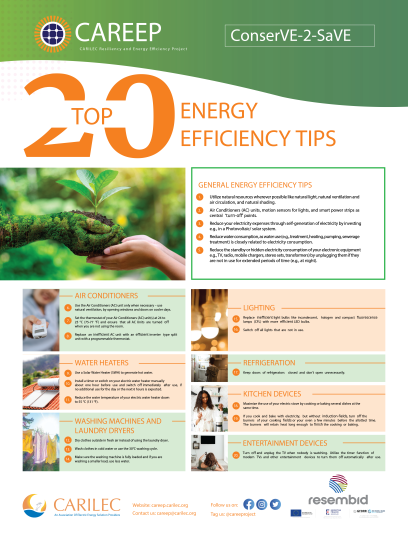
Energy Self-Audits for Caribbean Households
To keep your energy costs from being too high, you want to ensure you are being both efficient and conservative in your energy use. One easy way to ensure this is to take the time to have a home energy self-audit done.
While a professional home energy assessment is the best way to determine where your home is losing energy and where you can save, you can start to identify areas of high energy consumption and simple cost saving potentials by conducting your own energy self-audit. This “do-it-yourself” home energy assessment will not be as thorough as a professional home energy assessment, but it can help you to better understand your home’s energy consumption pattern and its energy performance to pinpoint some of the easier areas where you can make a change. Please find a short and a detailed implementation guide and additional information on how to conduct an Energy Self-Audit in your home under the following links:
- Short-version “CAREEP Implementation Guide for Energy Self-Audits”
- Detailed-version “CAREEP Implementation Guide for Energy Self-Audits”
- Excel template “Energy Self-Audit Consumption Inventory” (further instructions on its use can be found in the Implementation Guides for Energy Self-Audits)
- Word template “Energy Self-Audit Report” (further instructions on its use can be found in the Implementation Guides for Energy Self-Audits)
Energy Saving Tips for Households worldwide
Solar PV
Self-generation of electricity e.g., by a roof-top PV system and self-consumption reduces the purchase of electricity and saves electricity cost after the payback of the initial investment in the PV system. Check the required permitting procedure and possible support on the website of your national government and/or your regulatory authority. More tips below..
Home Energy Management
Natural light, natural ventilation and air circulation help save electricity for lighting systems and reduce the cooling loads during daytime and in summer. AC units consume the largest amount of electricity and are responsible for up to 70% of the electricity cost of a household. Cleaning windows from outside and inside also helps to improve natural lighting as dirt can block up to 10% of natural sunlight.
For new residential buildings, the orientation of windows, doors and other openings should carefully be selected and considered in the design to allow cross-ventilation of air, positioned to capture the optimum natural light, and take advantage of natural shading e.g., by trees to prevent unnecessary heating through sunlight etc. Laundry can be dried outside without the use of electricity, using the warm Caribbean summer breeze can allow quick and sustainable drying. More tips below…
- Install timers, sensors, switches and smart devices
- Wikipedia: Standby-Power
- Standby-Power Losses in Household Electrical Appliances
- IEEE- Standby Power Consumption in Belgium
- Truth about Stand-by-Power
- A guide for motion sensor installation
- How much electricity do motion sensors use?
- Save electricity through Motion Sensors
- How do motion sensors work
- The Beginner’s Guide to Motion Sensors
Energy-Efficient Room Cooling
Given the high contribution of the use of AC´s to the household´s electricity consumption, “less consumption is always better”. Try to use the Caribbean breeze and shading opportunities as much as possible to achieve a comfortable room temperature. If absolutely necessary, use AC units for a limited time only, e.g., to reduce room temperature before going to bed. Check out the links below to learn more…
Energy-Efficient Water heating
An electric water heater, if used in a household, consumes approximately 14% of the total electricity demand, being responsible for one of the highest energy expenses in the home. Limiting the operation time of an electric water heater as well as reducing the water temperature are the most effective energy saving measures for this device.
Energy-efficient water heating and boiling depends on a variety of factors: the amount of water to be heated, the primary or secondary energy sources used (gas, electricity, firewood, etc.), the type of heating or boiling technology (immersion heater, induction cooker, ceramic hob, standard hotplate, etc.) and type and size of the vessel for boiling/heating. Check out the links below to learn more…
Energy-Efficient Lighting
There are two main types of energy-efficient light bulbs available: compact fluorescent lamps (CFLs) and light emitting diodes (LEDs). LEDs are the most common and adaptable light fitting, and are suitable for replacing dimmable lights and spotlights. LEDs are also more energy-efficient than CFLs. More tips below…
Energy-Efficient Refrigeration
Surprisingly, with 4% of a home’s total electricity consumption, refrigeration devices (refrigerators, freezers, combinations) are ranked number 5 after the electricity consumed by light bulbs. Refrigeration devices are standard in any Caribbean household irrespective of the income level. More Tips below…
Energy-Efficient Laundry
Washing machines and laundry dryers are the third largest electricity consumers in a home. Unlike AC units and electric water heaters, washing machines are installed in almost all households. Laundry dryers are not standard in every household but if existent and in use, it belongs to the household devices with the highest electricity consumption. More tips below…
Energy-Efficient Entertainment
Entertainment devices like TV, (including DVR, cable box, video games, stereo system, speakers) count for about 3% of the total electricity consumption of a private home. These appliances may not use a lot of electricity like other appliances but leaving them on overnight will add up. Most TVs have timers that you can set to turn the television off after use. Entertainment devices like TVs and stereo systems are standard devices in any home with a TV being the most used device. More tips below…
Electricity Usage Monitors - User Guide
There are many different producers of electricity monitoring devices, but no matter the brand, the devices work very similarly. This booklet will provide a step-by-step guide on how to utilize energy monitoring devices in your home.

